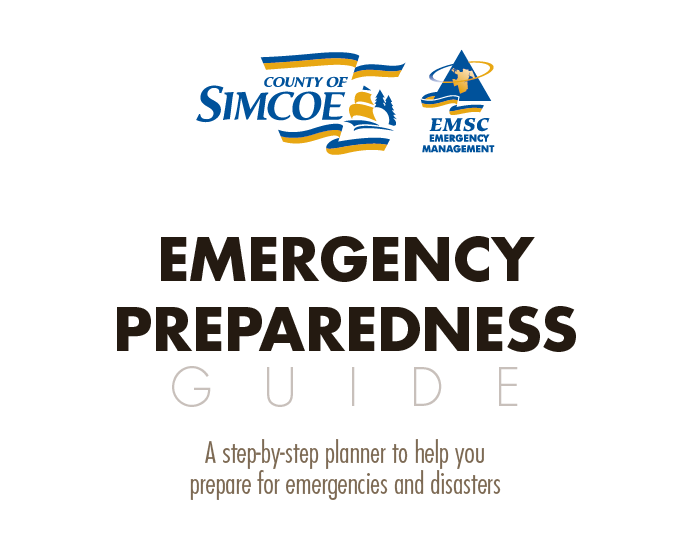Emergency Preparedness
With any emergency, it is important to respond quickly. At the Town of Innisfil, we're committed to keeping our community safe through emergency preparedness and emergency management.
Emergency Response Plan
The Emergency Response Plan provides an operational guideline for how the municipality will respond during an emergency. The plan provides key officials, agencies and departments with an overview of their responsibilities during potential, imminent and actual emergency situations.
Preparing for an emergency
Are you prepared for an emergency? Emergencies can happen anytime, anywhere.
Know the risks
Risks in our area include:
- Freezing rain
- Tornadoes
- Power outages
- Fire/explosions
- Human health emergencies
- Extreme cold
- Flooding
To learn about types of emergencies and how to be prepared visit Emergency Management Ontario's website.
Make a plan
Make emergency plans to know what to do before, during and after an emergency. Hold a meeting so that every family member is familiar with your plans.
|
Household Plan |
|
Every home should have an emergency plan. Use this online Emergency Preparedness Action Plan tool to help create a plan that will:
You can't predict an emergency, but you can prepare for one. Take action today! Tips
|
|
Workplace Plan |
|
Learn about the emergency evacuation plans in place and what you will need to do. You may want to have some basic supplies at work, such as water and food that won’t spoil, in case you need to stay put for a while. Check with your employer about workplace emergency plans, including:
|
|
Plan for Children |
|
|
Plan for Seniors |
|
Get a kit
In an emergency you will need some basic supplies. What do you require to ensure special needs are met? Create a ‘go bag’ in case you have to evacuate your home.
Consider these basic kit items:
- Battery powered radio and extra batteries
- Flashlight with extra batteries
- Lightweight blankets
- Emergency information, including insurance policies
- A list of medications and correct dosage, and doctor’s names and numbers
- Personal items such as toothbrushes, soap, extra eyeglasses, etc.
- Cell phone and charger
- Cash
- First aid kit
- Change of clothing
- Non-perishable snacks
- Books, cards or magazines to pass the time
- Extra keys for your car and house
- Keep photocopies of important family records and documents in a waterproof, portable container
- Infant supplies, if applicable
Put aside a 3-day supply of food for your household.
Consider:
- Usability - Choose high energy food items that don’t need to be cooled, heated, or need a lot of water. Examples include nuts, protein bars, canned or dried meat, dry cereal, canned vegetables, graham crackers or even chocolate. Make sure you have a manual can opener if you plan to use canned goods.
- Shelf life - Look at the expiration date listed on the food item. Use and replace foods before the expiration date.
Store a 72-hour supply of water
Have at least 2 litres per person per day. Include small bottles that can be carried easily in case of an evacuation order. Change your stored water supply every six months to ensure it stays fresh.
|
Additional items |
|
Recommended additional items include:
|
|
For individuals with disabilities or special needs |
|
Talk with family to identify unique needs. What things could your household members not do without? Consider:
Consider those with disabilities:
|
|
Car emergency kit |
|
You should also consider keeping an emergency kit in your car. Items should include:
|
|
Pet emergency kit |
|
You should also consider your pets as they can require different items than your emergency kit. Items should include:
|
Stay informed
Follow these resources to stay informed during emergency events:
- Facebook @townofinnisfil
- X/Twitter @townofinnisfil
- Instagram @townofinnisfil
- Local news media – television and radio
- Alert Ready: Alert Ready delivers emergency alerts to Canadians through wireless devices. Learn more about the system and check your mobile phone’s compatibility.
During an emergency
Call 9-1-1 if you need police, fire or paramedics to respond immediately to a fire, medical emergency, or crime in progress. A medical emergency involves a serious or life-threatening injury.
What you should do during an emergency
When an emergency happens, you should:
- Remain calm
- Check for hazards in your immediate area
- Check yourself and others for injuries and provide first aid or get help if needed
- Check on neighbours, especially the elderly, people with disabilities and children
- Stay informed – monitor radio, TV and social media for updates and instructions
- Get your emergency kit and follow your emergency plans
Evacuations |
|
In some situations, you may need to evacuate. Authorities will not ask you to leave your home unless you are in danger. If you are advised to evacuate:
|
After an emergency
Review what to do and how to cope after an emergency.
What to do |
|
After an emergency:
|
How to cope after an emergency |
Children and emergenciesChildren may experience some anxiety and fear after an emergency and parents can help them to cope by taking steps to reassure them and keep them safe.
What you and your family might experienceEmergencies are stressful events and individuals react to them in different ways.
|
Insurance |
|
You should check your insurance policy before an emergency to find out if you have enough coverage and exactly what types of damage will be covered. For insurance purposes make sure you:
If an emergency damages your home or possessions take immediate steps to protect your property from more damage and contact your insurance company as soon as possible. For free information on car and home insurance, call the Insurance Bureau of Canada’s consumer information line at 1-800-387-2880 or visit the Insurance Bureau of Canada. |
Flood preparedness
Like any community in southern Ontario, Innisfil is vulnerable to a variety of natural hazards, including floods. We've developed a variety of resources to help you respond quickly and safely during and after a flood:
If your home or property has been damaged by a flood, you may want to submit a flooding claim.
Additional resources
For more emergency preparedness information, visit:


